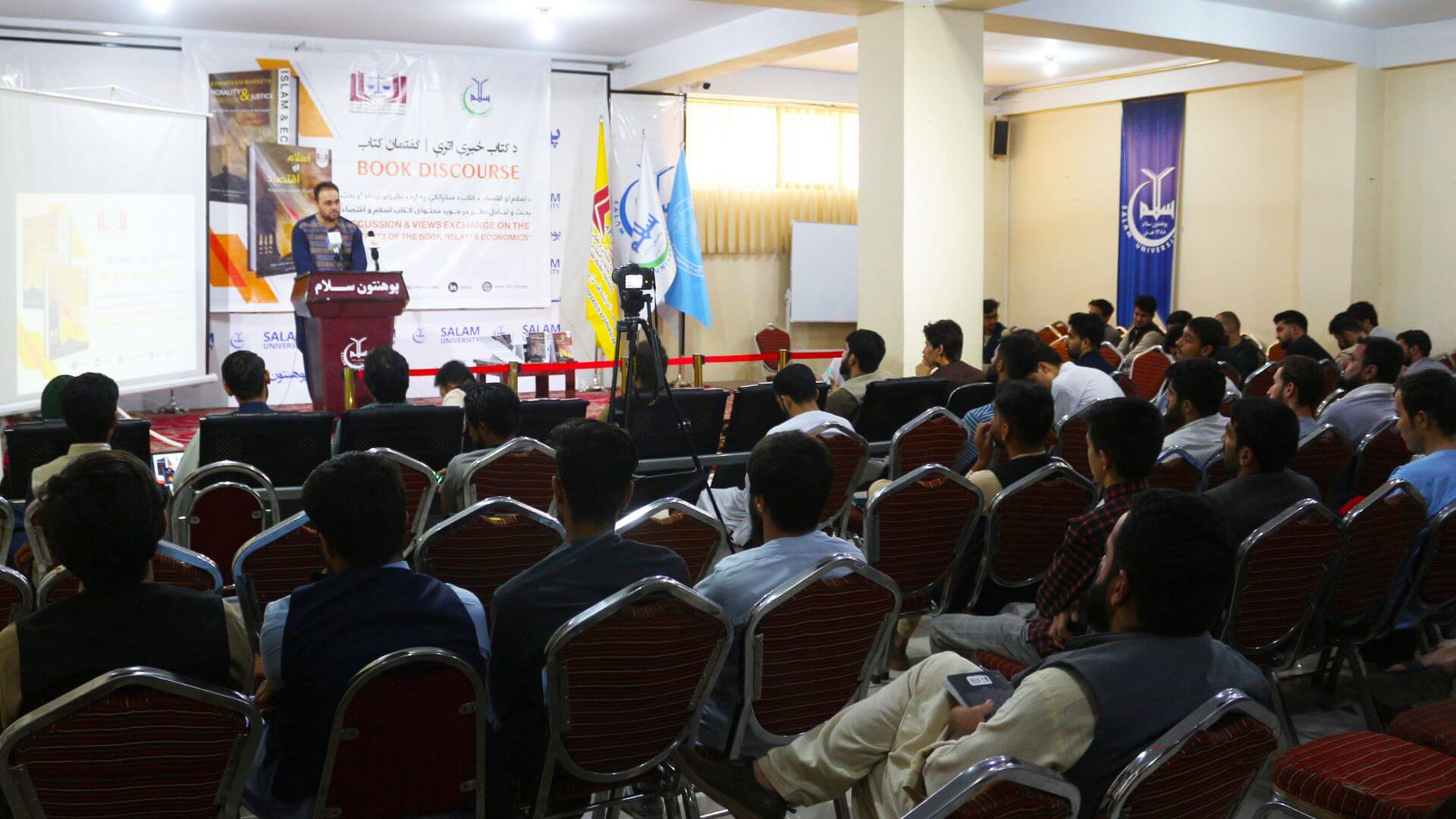
Book Launch Event of Islam & Economics | Kabul
The Afghanistan Economic and Legal Studies Organization (AELSO) is proud that by continuing efforts & hardworking of its research department; translated and published the “Islam & Economics” (A Primer on Markets, Morality, and Justice) book which is written by, Ali Salman, the CEO of Islam & Liberty Network, into Pashto language for the first time in Afghanistan.
The book launch event of “Islam & Economics” held in conference hall of Salam University with the online presence of author and participations of The Afghanistan Economic and Legal Studies Organization (AELSO) leadership team, Salam University board members and more than 100 youth from various universities of Afghanistan.
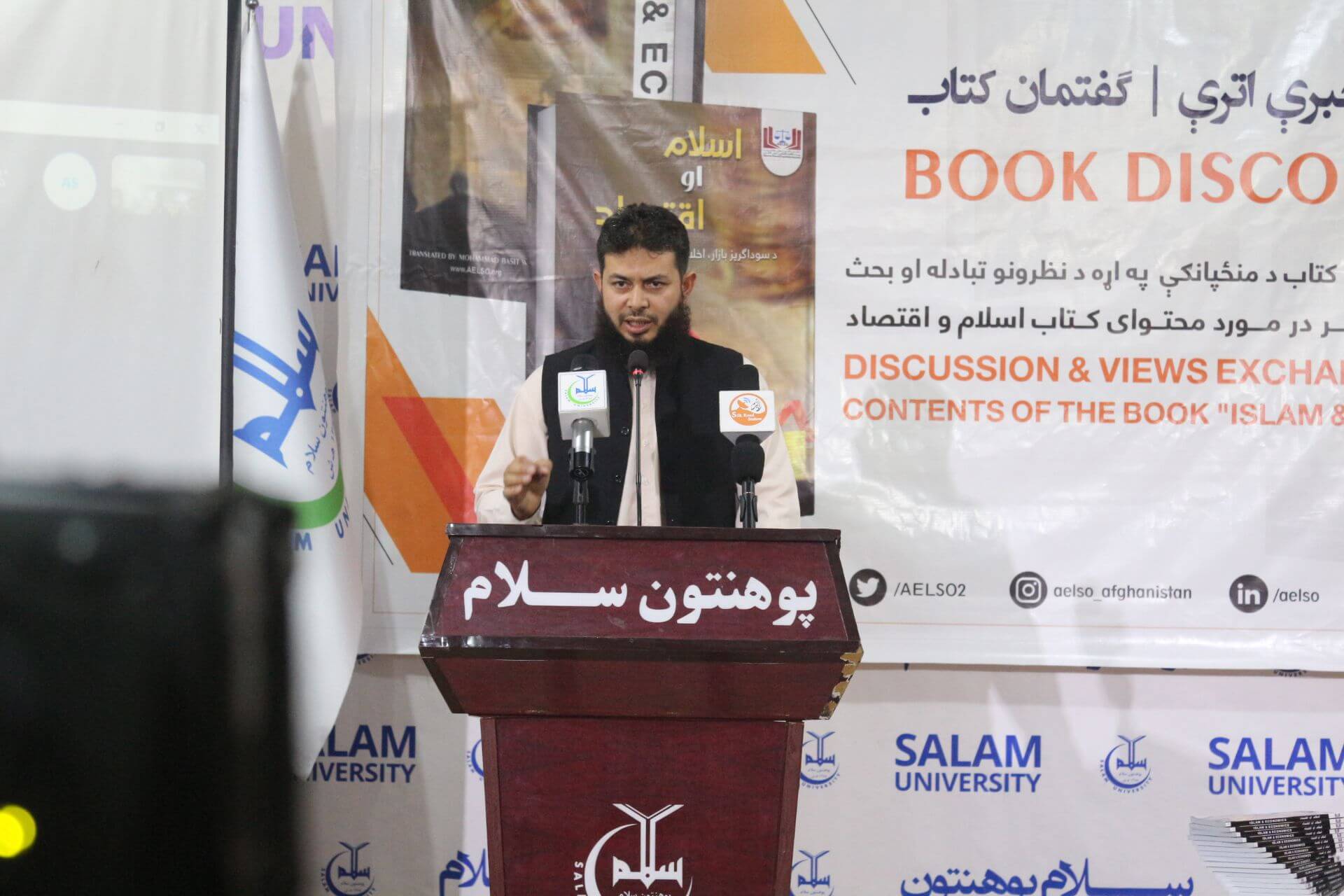
Dr. Mohmmad Tamim Sediqi, Vice Chancellor of Salam University, talked about the perspective of academic institutions about publishing such academic books in Afghanistan and said: ” Universities have great role in development process of a country. In particular, universities have two major responsibilities; providing educational services and conducting scientific research, which includes publishing articles and books. The religion of Islam has also given a special place to learning and studying, so that the first verses of the Holy Quran began with the word “Iqra”. On behalf of Salam University, I would like to thank The Afghanistan Economic and Legal Studies Organization (AELSO) for translating and publishing of such important book at the current situation of Afghanistan that can teach Afghan nation a lot of important issues.”
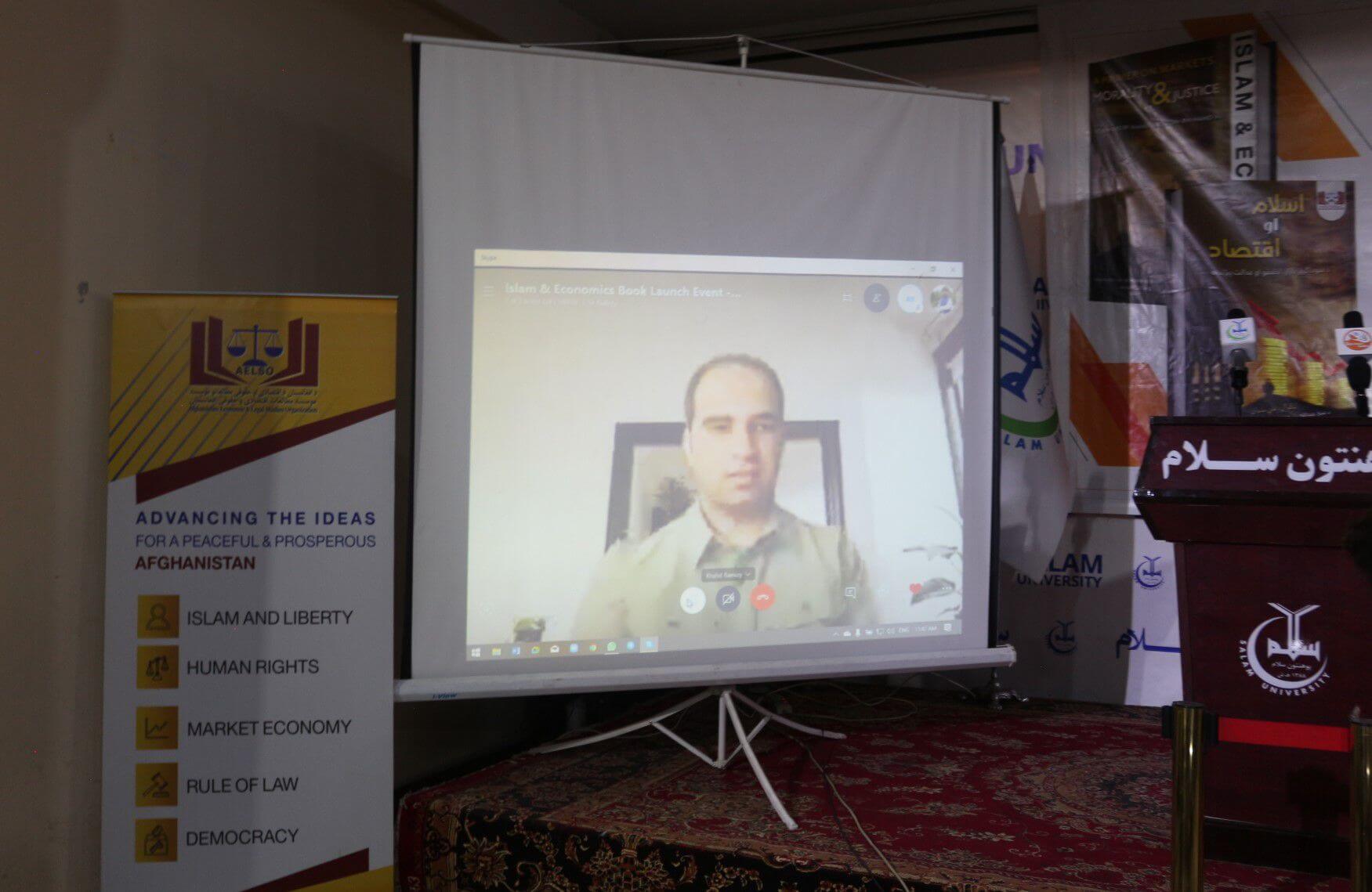
Mohammad Khalid Ramizy, Research Scholar at University of Pittsburgh & Senior Member of The Afghanistan Economic and Legal Studies Organization (AELSO), spoke about the importance of publishing the “Islam & Economics” book by AELSO and pointed out: ” For the past 20 years, The Afghanistan Economic and Legal Studies Organization (AELSO), has done different activities for capacity building, growing and flourishing youth talents and promotion of the free society values and its compatibility with Islam. The book “Islam & Economics” which is written by Ali Salman, the CEO of Islam & Liberty Network, is a great and very new book for sharing the compatibility of Islam with free society values and I am sure that this book can play a very important role at the current situation of Afghanistan. In my view, this academic book has following remarkable & strength points:
1) This book is written in a very simple and fluent language
2) This book is written comprehensively which includes major topics
3) This book is related to the author’s field of study & activity which is unique
Afghanistan Economic and Legal Studies Organization (AELSO) is the first think tank in the country which promotes the compatibility of real Islamic values with the values of free society by printing & publishing books, producing radio programs, and organizing numerous academic programs for youths in all over the country.”
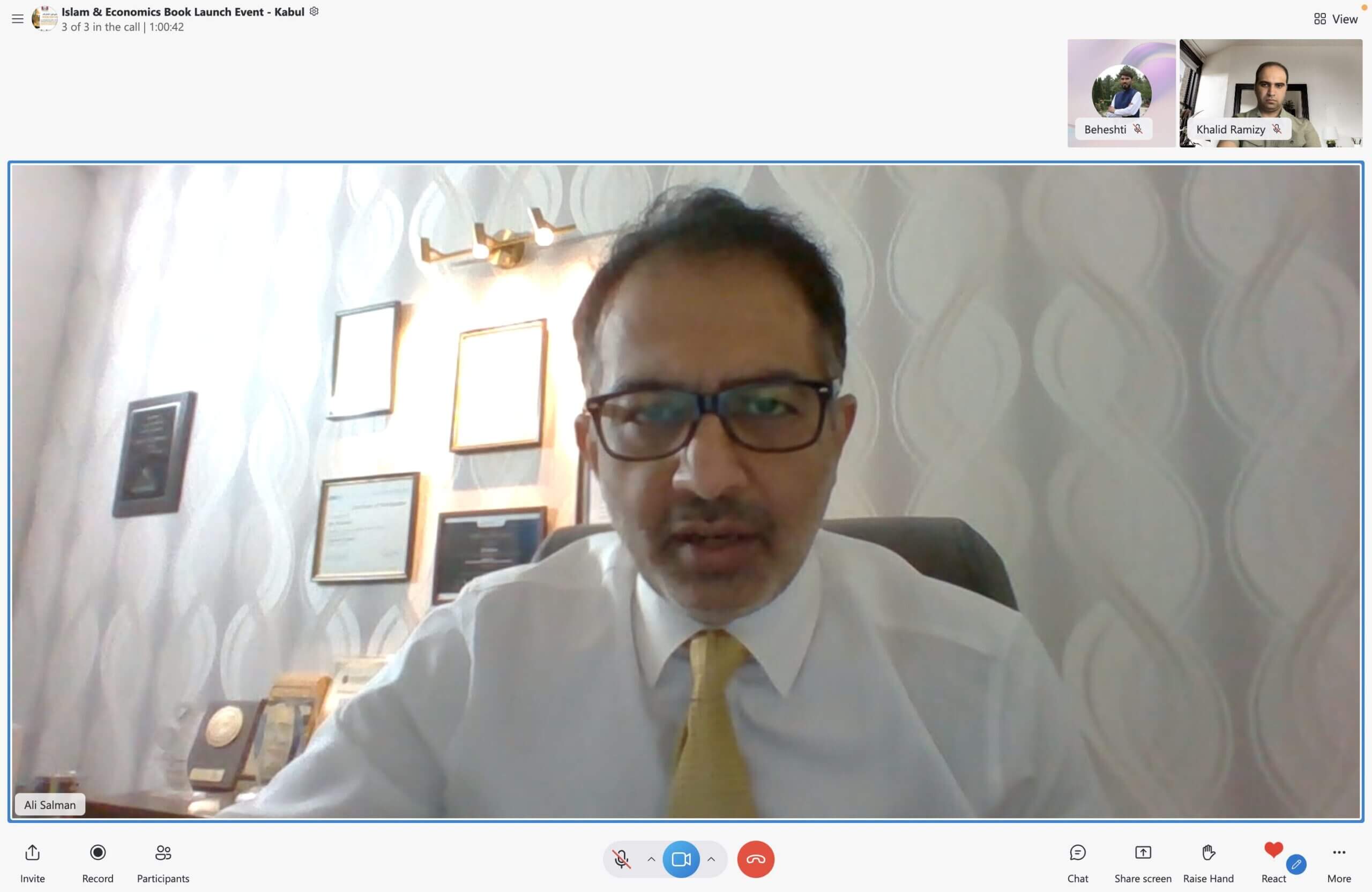
Ali Salman, the CEO of Islam & Liberty Network, author of the “Islam & Economics” book, after the brief introduction of the “Islam & Economics” book, talked about the impacts & effects of its contents in Afghanistan and other Islamic countries and said: ” I express my deepest gratitude from The Afghanistan Economic and Legal Studies Organization (AELSO) for conducting today’s event and publishing the “Islam & Economics” book. Nowadays, world is facing the huge economic crisis which requires intelligent, accurate and remarkable management to overcome this challenge. Islamic economy has become a significant and discussed topic among Islamic scholars, scientists and researchers from the past century. The base & foundation of the Islamic economy that we are familiar with today, was established by the Holy Prophet Muhammad (PBUH), who managed this system as merchant, guide & leader that after him, his followers continued the system that way.
In general, the Islamic economy of the time of the Holy Prophet (PBUH) has the following characteristics which relying on it, we can have a prosperous and Islamic society:
1) Specific policy for tax collection (taxpayer, tax receiver)
2) The role of society in institutionalizing the principles of Islamic economy
3) Islamic banking system
4) Rate and currency control system
5) “Market competitions”
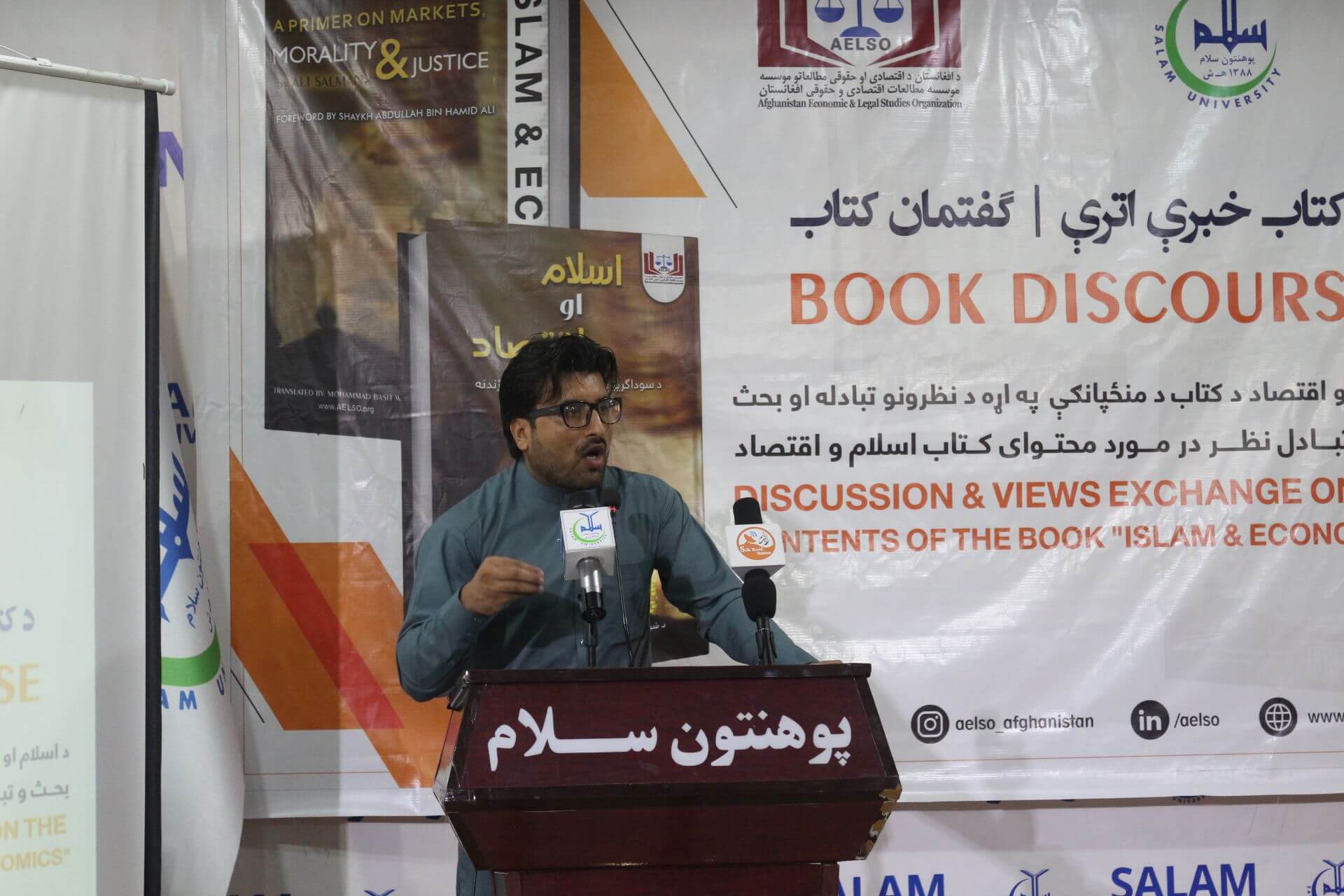
Dr. Abdullah Sadiq، Dean of the Economy Faculty at Salam University, talked about the importance of enhancing culture of reading books among youths and emphasized: “Learning & studying are the keys toward political, economic, social and cultural development in a country and the source of learning knowledge is studying various types of books and conducting research in all aspects and fields. By enhancing the culture of reading among youth, we can build the character of whole society members. Youth of the country has responsibility to not only rely on universities curriculum and try to study different books for improving their understanding.”
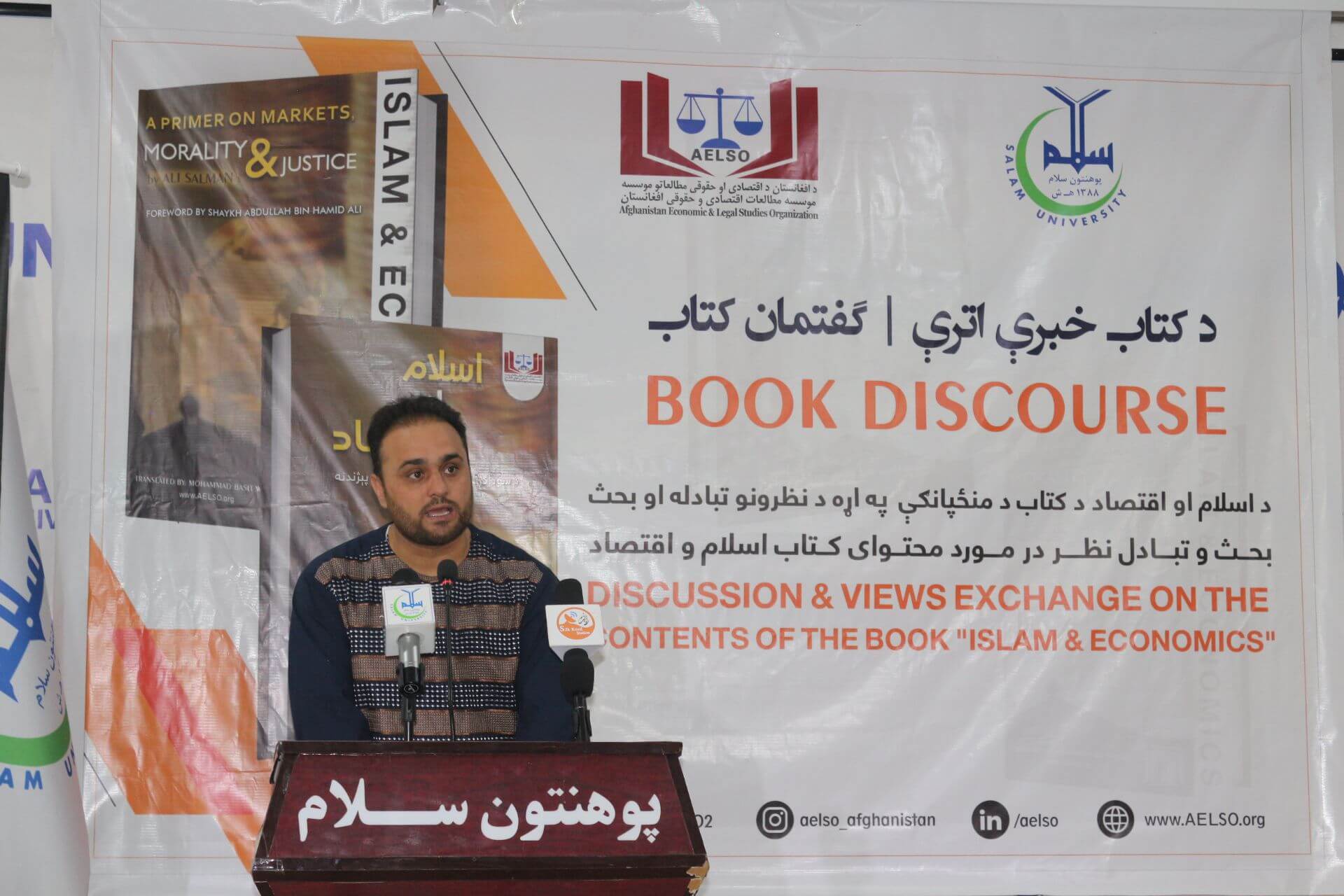
Dr. Khyber Kheshki, university professor, talked about the impacts and benefits of studying this book and said: ” I also express my appreciation for the hard work & efforts of The Afghanistan Economic and Legal Studies Organization (AELSO) in promoting the ideas of prosperity and development in the country and congratulate the publication of this valuable piece to the academic society of Afghanistan. About the effective way of studying this book, I express my views in few following points:
1) The sequence of topics in the book:
This book, which covers four main topics; Islam and the market, right and justice, the sense of ownership and framework of the economic system are discussed in a fluent and readable manner.
2) The update content & compatibility of this book with our today’s society: From two aspects, the topics of this book are compatible with our today’s society;
a)This book is about Islamic economy which is important to consider in our Muslim society
b)The last year changes (Collapse of republic in Afghanistan) caused the change of the market system to the Islamic system, so this book can become a reliable scientific source in order to obtain more information about the Islamic system
3) Valid Sources of the book: This book has 92 valid sources and all jurisprudential tips are also considered in it.
4) This wonderful book has been translated with simple Pashto grammar and literature, which will be attractive to the readers”
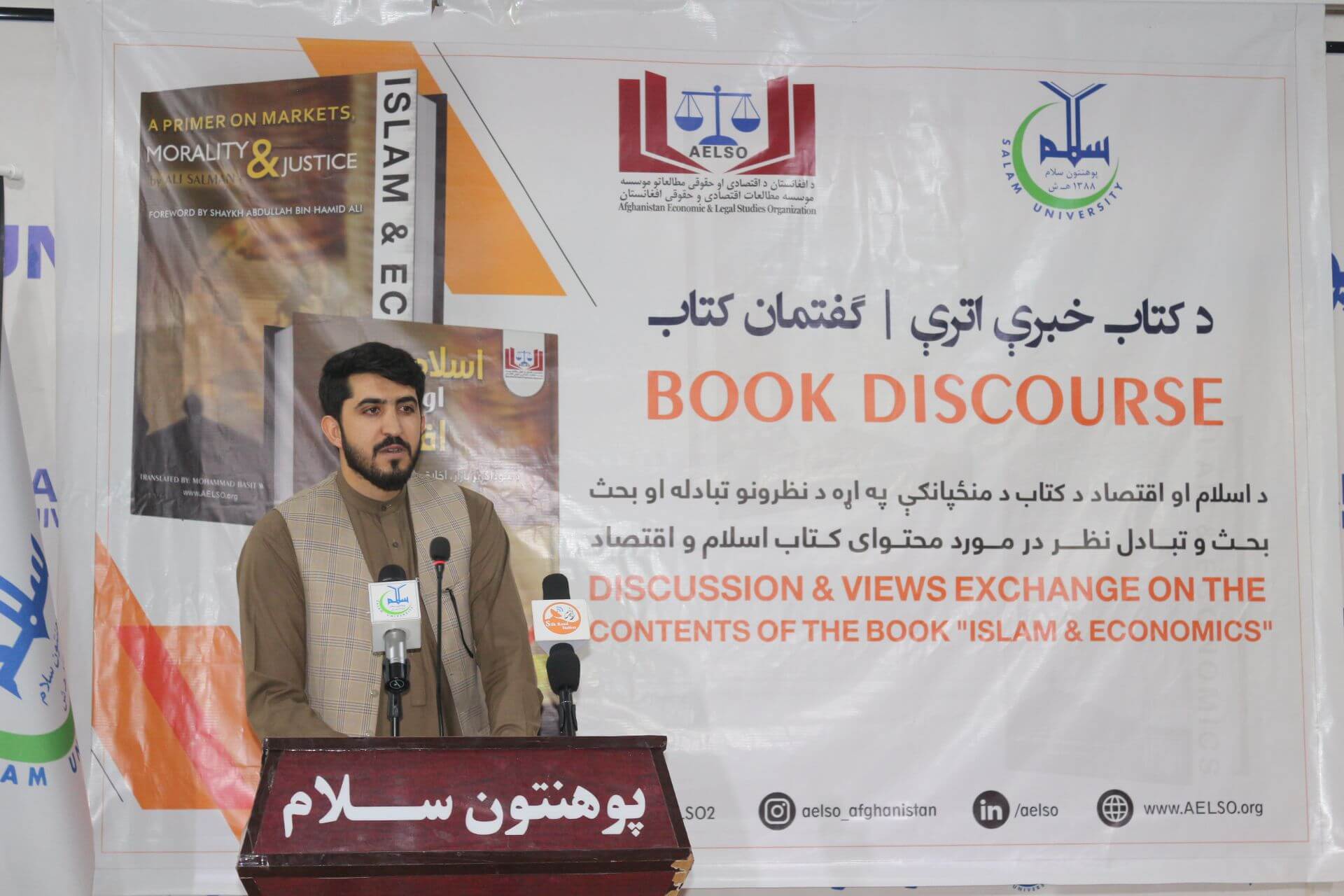
Mohmmad Basit Wahidi, translator of the “Islam & Economics” book into Pashto language talked about the basics of translating the mentioned book and said: “I am very thankful from The Afghanistan Economic and Legal Studies Organization (AELSO) for entrusting me with the responsibility of translating this valuable piece. In the translation process of this academic book, we have tried our best to make it easier and understandable for readers. In part of translating the holy Quran verse & hadiths, we considered all aspects of the translation so that there will not be any mistake in the transfer of the understanding of holy verses and hadiths. This book has been revised and corrected more than dozens of times by experienced professors who are masters in the field of translation and dedicated to youth of the country.”
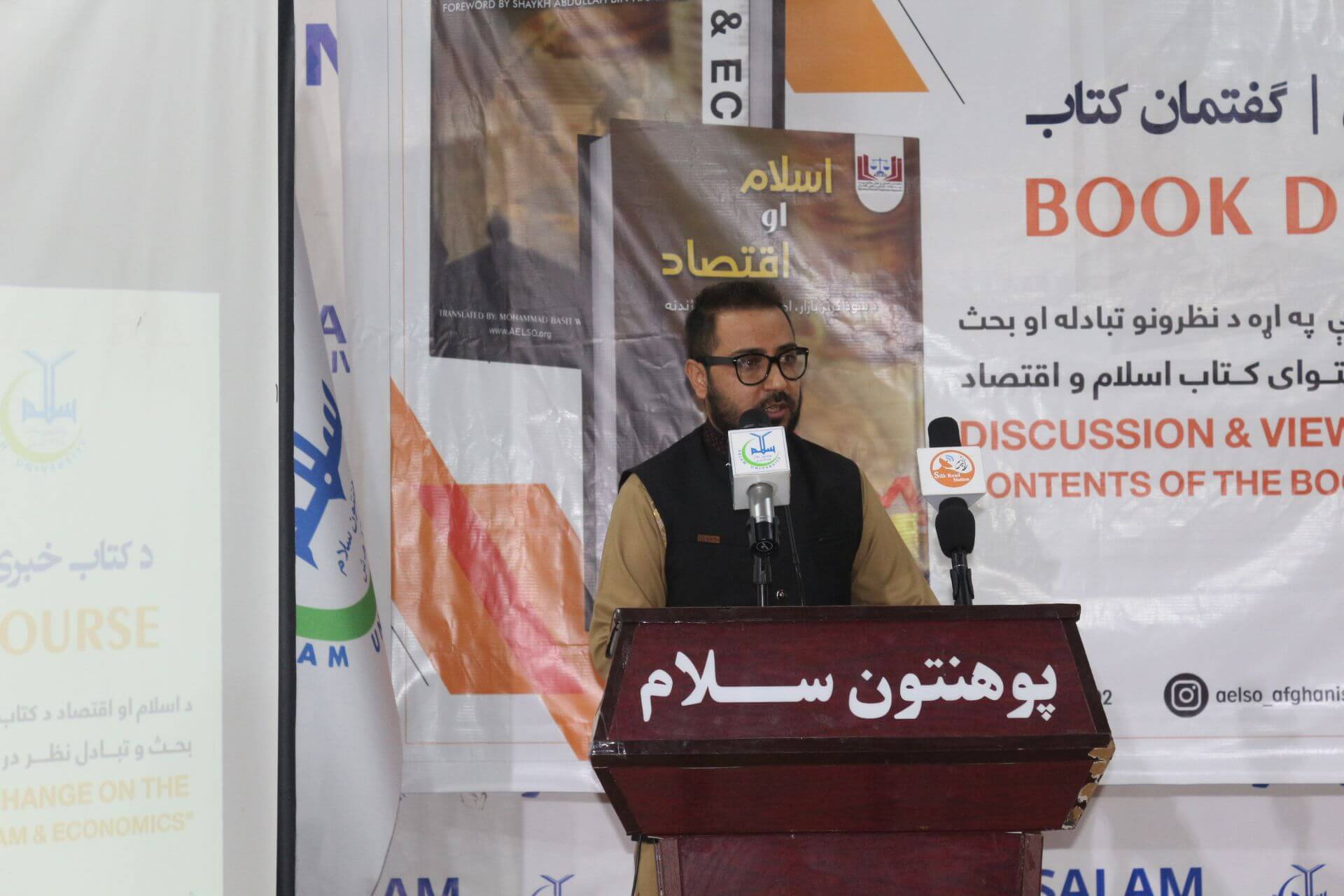
Hanif Farzan, Chairman of AELSO, summarized the importance of the “Islam & Economics” book and said: “Afghanistan Economic and Legal Studies Organization (AELSO) is proud to launch the book of an international author in a prestigious center such as Salam University. This academic book can be used as valid source for educational system of the country. This book will particularly help youth to enhance their information about; market economy, and learning about the principles market within an Islamic framework in Afghanistan.”
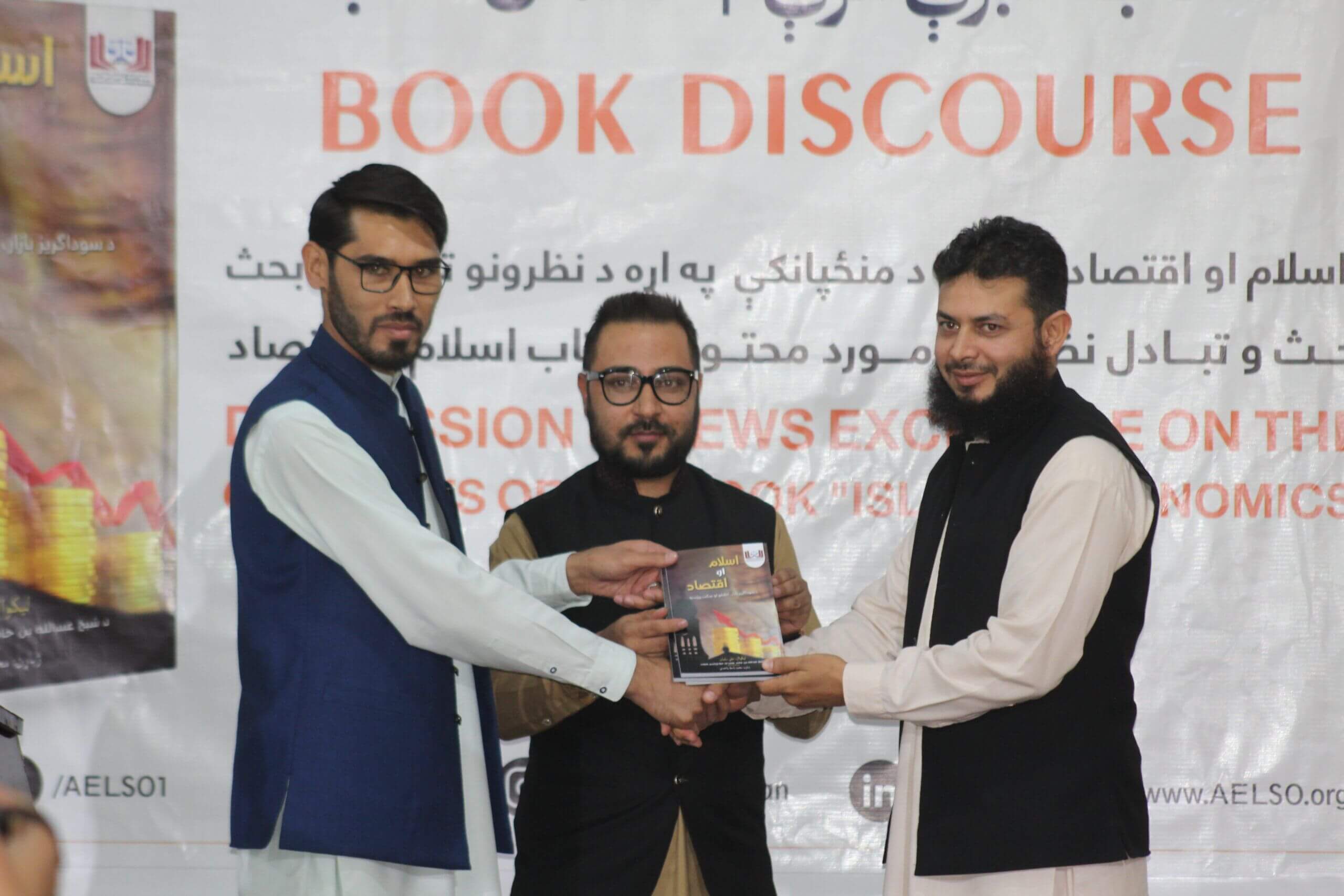
In order to promote the ideas of market economy, economic development and strengthen the effective ideas to create a peaceful and prosperous Afghanistan, The Afghanistan Economic and Legal Studies Organization (AELSO) distributed the “Islam & Economics” book to all participants of the event.
You can order the electronic or hard copies of this book through the following email address:
publications@AELSO.org
For watching video report of this event click here
Relations & Publications Department